SEPTEMBER
2006
01 | Rinsing Off the
Mouthpiece
By GorDoom
02 | Poem of the Month
By Tom Smario
03 | Pollack's Picks
By Adam Pollack
04 |
Top Women Worth Watching
and Televising
By Adam Pollack
05 | Tournament
of Champions: Boxing's Lineal Mathematics
By Cliff Rold
06 | Roberto Duran, Unplugged
By Juan C. Ayllon
07 | Appreciating Chuck
By Thomas
Gerbasi
08 | Thistle in the Rose
By James Glen
09 | Anton "The Sheik" Greek
By Jerry Fitch
10 | Interview with Don Fraser
By Juan C. Ayllon
11 | Boxing's Good Book [PDF]
By Don Cogswell
12 | "John L. Sullivan: The Career
of the First Gloved Heavyweight Champion" [PDF]
By Adam Pollack
13 | Three Book Reviews
By Katherine
Dunn
14 | What's in a Name?
By Ted Sares
15 | Audio
From the Archives [mp3]
The CBZ presents another classic boxing-themed radio
show. This month we bring you an episode of Duffy's Tavern ("Where the elite meet to eat"), from
April 13, 1951, starring Maxie Rosenbloom.
|
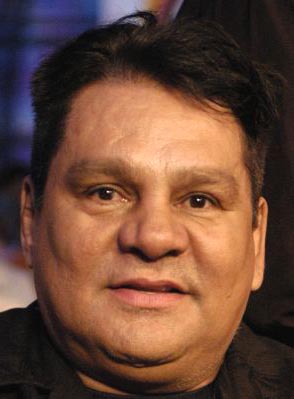
Roberto
Duran, Unplugged
Interview by JUAN C. AYLLON
Roberto Duran ruled the lightweight
division with the cunning and savagery of a great white shark feasting on seals off of
California's central coast. Nicknamed "Manos de Piedra" -- or "Hands of Stone" -- Duran
shocked the world on June 26, 1972, with his ferocious stoppage of WBA lightweight
champion Ken Buchanan.
In November 1972, Duran lost a nontitle bout to Esteban De Jesus, but crushed him in two
subsequent rematches.
As such, Duran remained a fixture atop the food chain of the waters of the lightweight
division, circling, terrorizing, and savaging opponents for roughly five and a half years.
In the process, he established himself as perhaps the best lightweight champion the world
had ever seen. Then, fresh out of competition, he decided to move up in weight class in
search of larger prey.
On June 20, 1980, Duran astounded the boxing world by upsetting media darling and 1976
Gold Medalist Sugar Ray Leonard in Montreal by unanimous decision over 15 rounds.
An incorrigible partier who struggled with weight loss issues throughout his career, five
months later, Duran pulled the infamous "no mas" incident, where, sickened from too much
weight lost over too little time, he turned his back on his antagonist and quit at 2:44
into the eighth round.
On January 30, 1982, Duran lost a unanimous decision to two-time world champion Wilfredo
Benitez for the WBC Light Middleweight Title and, in November of that same year, lost by
split decision to Kirkland Lang in Ring Magazine's "1982 Upset of the Year."
Nonplussed, Duran came back to win the WBA Light Middleweight Title over highly-touted
Davey Moore by TKO in the eighth round on June 16, 1983. Later that year, he lost a
unanimous decision in a rousing challenge to undisputed Middleweight Champion of the
World, Marvelous Marvin Hagler on November 10.
Duran lost the WBC Light Middleweight Title by TKO to Thomas Hearns in two rounds in June
1984, then he won the WBC Middleweight Title four years later in June 1988 over powerful
Iran Barkley -- who'd knocked out Thomas Hearns -- by split decision.
And, on January 1989, he lost his third bout against Sugar Ray Leonard by unanimous
decision for the WBC Super Middleweight Title.
Duran's final bout was a meaningless one, a 12 round unanimous decision loss to Hector
Camacho on July 14, 2001. All told, over a career that lasted over 33 years, Duran racked
up a record of 103-16 and 70 knockouts.
(Click here
to view Roberto Duran's record.)
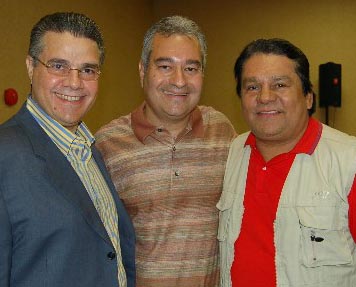 Since retirement, Duran became a partner in a boxing promotional concern called DRL. Its
principals consist of Dan Wise (the "D" in that acronym), Roberto Duran (R), and Luis De
Cubas (L). According to Arturo Sanchez, director of operations for DRL, De Cubas picked up
Roberto Duran as a promoter when many thought he was washed up and "got him the fight with
Iran Barkley, opened up the Mirage, and made him more money than Bob Arum and Don King
combined."
Since retirement, Duran became a partner in a boxing promotional concern called DRL. Its
principals consist of Dan Wise (the "D" in that acronym), Roberto Duran (R), and Luis De
Cubas (L). According to Arturo Sanchez, director of operations for DRL, De Cubas picked up
Roberto Duran as a promoter when many thought he was washed up and "got him the fight with
Iran Barkley, opened up the Mirage, and made him more money than Bob Arum and Don King
combined."
DRL's stable currently includes Julio "Baby Face" Cesar Garcia (38-2, 33 KO's) -- who
allegedly cracked Jose Luis Castillo's ribs in sparring and thus torpedoed Castillo's
efforts to make weight for Castillo-Corrales III -- and Joel Casamayor (33-3-1, 21 KOs),
who will be fighting Diego Corrales (40-3, 33 KOs) in a rubber match on October 7th at the
Mandalay Bay in Las Vegas. Casamayor and Corrales had split a pair of bouts previously.
As with many greats in boxing, Roberto Duran began life in a rough and tumble
neighborhood. Duran was born in El Chorillo, Panama, on June 16, 1951 to Margarito Duran
and Clara Estelle Samaniego. He grew up with eight brothers and sisters in a time that,
according to Duran, was "when the invasion started, when the Americans came in."
Continuing, he said, "Growing up, it wasn't as tough as it is now. I used to get in a lot
of fights as a child."
Some of his siblings are, as Duran put it, "fighters right now, some of them are musicians
and just local people at the house."
When pressed further on personal matters, Duran was quick to put up a defense. His
daughter, Dalia Duran later confided that Roberto was very guarded about his personal
life. Moreover, he had just completed a long day of media interviews for an upcoming fight
card. And, as Roberto pointedly put it, he wanted to save something for a future movie.
Nevertheless, in an exclusive interview, Duran demonstrated great candor as he talked at
great length about various aspects of his fabled career. A fierce and fiery fighter inside
the ring, Duran's passion boiled over at times, leading him to preempt his interpreter,
Arturo Sanchez, and speak directly to me in broken -- and sometimes mixed -- English and
Spanish. And, as you will see, Duran's pride in his boxing career speaks volumes for
itself.
JUAN AYLLON: How are you?
ROBERTO DURAN: Everything's fine. I only have
a little headache from all the interviews I've done today with the Julio Caesar Garcia
fight [coming up], but everything's okay.
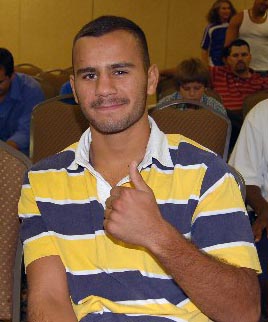 How did you get into boxing, and how successful were you when you first
started?
How did you get into boxing, and how successful were you when you first
started?
At the beginning of my career, I was going into boxing because of my
brother. It wasn't about money or anything like that. I didn't win any money at the
beginning of my career; it was more about the love and passion for boxing.
Were you disappointed about not going to Winnipeg for the 1967 Pan Am games?
At
that time, I wasn't upset because they used to send the military, even though I had won a
right to represent my country at the Pan American Games, they chose to go ahead and put
the military boxing team in front of me. But, I wasn't upset about that. I think it was
politics, and I didn't get involved into those kinds of things.
Tell us about your experiences with Ray Arcel and how he helped you become a better
fighter.
I met him through my manager, Carlos Eleta, but for me, I had other, more
experienced people in my corner than Ray Arcel -- Freddie Brown and Nestor Quinones.
That's Nestor Quinones, who's also training Joel Casamayor now; he's also helping train
Casamayor.
Did you also study any of Arcel's fighters?
You know, after my career with
them, and I moved on, I really didn't keep track of them. And, yeah, I know they passed
away, but it was during that period they were with me and, after that, we sparred a ways
-- quite a ways.
Tell us about the best fighters you ever fought at any division. Did you have any idols
growing up?
You know, they've all been good. I fought everybody. They're all good.
The only difference was, that I was a class above them, but there was no difference. Once
you're at that level, everybody's the same. You know, everybody looks the same, feels the
same. It's a little bit different. [Directly to me] I fought everyone, si!
[Through the interpreter] While I was growing up and even though I moved up in
different divisions, some of the best fighters I have ever faced were some of the fighters
growing up in Panama. It was a different time and a lot of them, unfortunately, didn't get
up to the level that I eventually got up to. But, some of the earlier Panamanian fighters
that I used to fight were some of the best fighters that I have ever fought. They were the
toughest fights. They were the more aggression fights. They knew everything. They were
just more skillful fighters than what I was facing later on in my career.
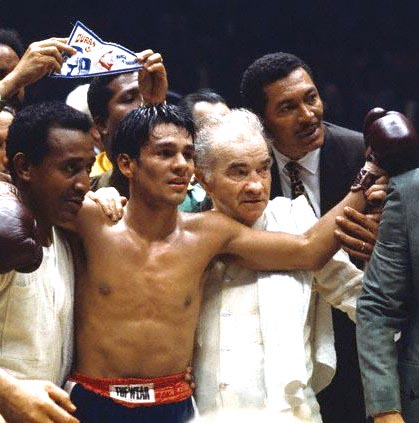 But, even afterward, after that, everybody in my division was just a tough opponent. You
know what I mean? Everybody who's a professional, who's at that level, is always going to
be a tough opponent. So, it's really hard just to single out just one person. They're all
tough. But, I can definitely remember growing up and moving up, that the early Panamanians
were the toughest.
But, even afterward, after that, everybody in my division was just a tough opponent. You
know what I mean? Everybody who's a professional, who's at that level, is always going to
be a tough opponent. So, it's really hard just to single out just one person. They're all
tough. But, I can definitely remember growing up and moving up, that the early Panamanians
were the toughest.
What other fighters did you admire in boxing?
The only fighter I admire,
besides myself, is Bernard Hopkins. Look what he was able to accomplish, even as he was
older, look what he did!
Tell us about your fight against Ernesto Marcel, and Marcel as a fighter.
[Directly to me]: Too long a story! [Through the interpreter]: That's too
long a story with that particular fighter.
Is it true that you knocked out an opponent, and then his girlfriend when she entered
the ring and began attacking you?
What really happened is I fought this Nicaraguan
fighter and after I knocked out the boyfriend, the girlfriend came on top of the ring, and
I just simply pushed her out of the way, not to get in a scuffle with her, and it ended up
that she fell out of the ring. And the Nicaraguans wanted to get back at me. But, I never
punched her. She just happened to come toward me and I just pushed her out of the
way.
Now, after you knocked out Ray Lampkin in the 14th round of your fight, you said that
if you fought him again, you said that you'd kill him, or put him in the morgue. Was that
a case of being caught up in the moment, or a true reflection of your feeling at the time?
I had to come down in a lot of weight, and I knew that I was a better fighter, a
more complete fighter. He just certainly caught me on a day that I was out-trained and I
wasn't up to par. But, I knew that if it was any other circumstances -- a lot of times,
you know, in those circumstances when writers are asking you questions of what you feel at
the time, you say what you feel at that precise moment. But, I really do feel I was a
better fighter, a complete fighter and he just caught me off guard that day. I lost a lot
of weight and I was moving down in weight, and I was caught off guard. It was one of those
days he caught me and it was just his day.
Speaking of which, when you were lightweight champion of the world, you were renowned
for letting your bodyweight go up to 185 pounds, then starving to get down to the
135-pound limit and being very belligerent and edgy during those times. Was this by
design? What actually happened?
It's quite the opposite, actually. It's a fact
that when you're starving yourself, you have less energy. You have less energy to exude.
So, obviously, that wasn't working to my advantage, if that was what my inclination was.
You know, obviously, if that's what happened during that period, I would to knock out that
fighter quickly or, if not, just try to box with him and try to keep in the game with him.
But, that was never to my advantage. Any time you're starving yourself, you're a fighter
with less energy, you start hallucinating more toward things, you don't see clearly, you
don't rationalize, so it definitely wasn't an advantage to get my weight up and try and
lose it by starving myself.
That was never the game plan. What happened was the game plan was to try to knock him out
quickly or simply by trying to hang with him, and hopefully, I would get the knockout
punch, which, many times it happened, but never, never working to my advantage as far as
starving myself. That was never an advantage.
When you're at a young age, you have a high metabolism like I used to have, especially
during the beginning of my career. Then everything is easy. A lot of times, I would starve
myself and work hard on trying to lose weight, that a lot of the punches that I took in
the ring [during sparring sessions] -- which were a lot harder than the actual fight
itself -- I would take in the ring.
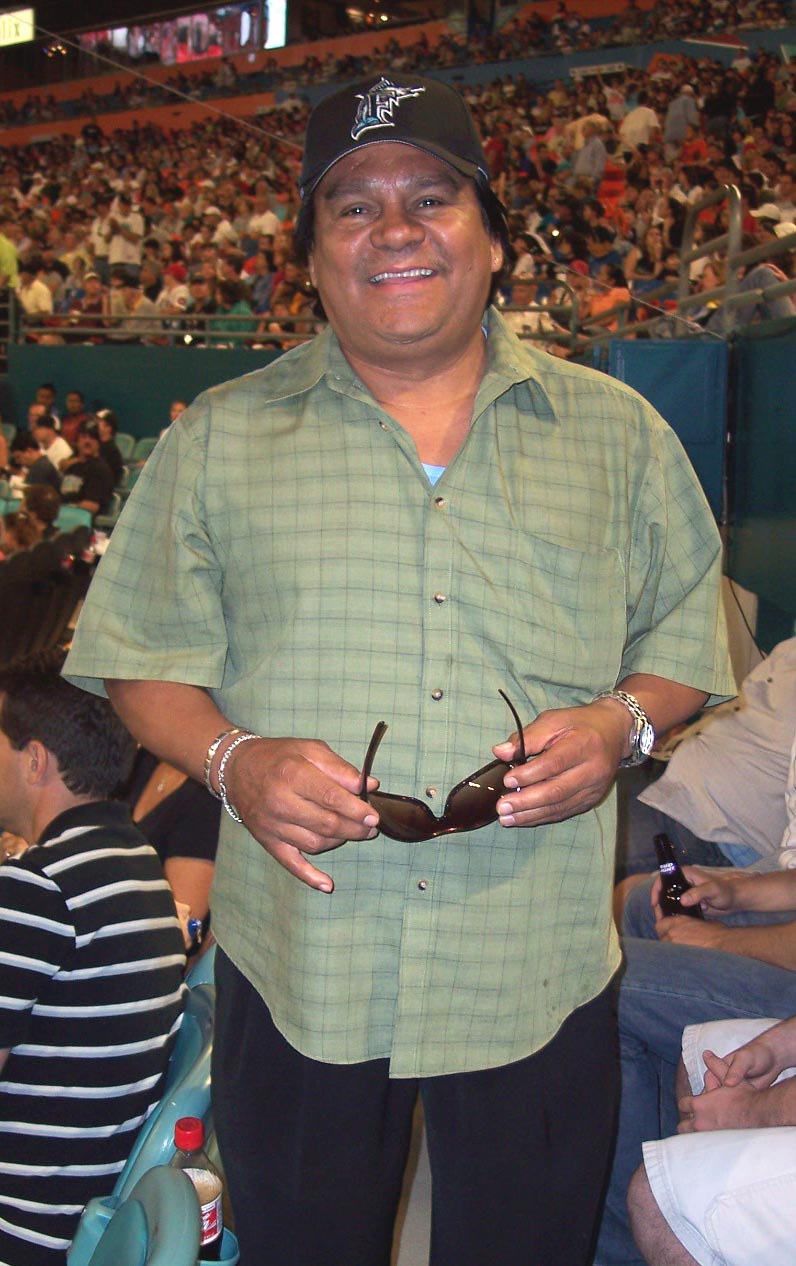 When I was in the ring, like in an actual fight, I would not allow him to actually hit me.
So, when I was sparring, a lot of the fighters I would spar would hit me a lot much harder
than in the fight itself. And I was always prepared that way, mentally and physically.
When I was in the ring, like in an actual fight, I would not allow him to actually hit me.
So, when I was sparring, a lot of the fighters I would spar would hit me a lot much harder
than in the fight itself. And I was always prepared that way, mentally and physically.
So, when you're a lot younger, your weight comes off that much faster and it's a different
type of metabolism.
You never gave Ken Buchanan a rematch, although he lobbied strongly for one. Why not?
And if you had, how would you see the rematch playing out?
My management team
never told me that he wanted a rematch. If not, if they would have told me, I would have
given him a rematch that much quicker, simply because I knew he was afraid of me, and the
power I possess, and it wouldn't be any problem. I would have knocked him out that much
faster and quicker. Just because I knew what he was about and the power that he possessed,
he wasn't aware of what I possessed.
I knew him better than he knew me. This was going to change everything. I was going to be
much faster, much swifter, and much stronger. The same way he fought the first time, he
was going to fight the second time. And nothing was going to change. It would have been
the same thing, the same thing.
Now, had you fought the following people, how would you see these fights playing out?
Antonio Cervantes.
When he fought, the only thing he had over me was height. But,
the fight, I could have won in three or four rounds. That finisher right hand that he had,
well, that's [inaudible]. He had the height advantage over me. I had a hard time losing
weight. It's just one of those things that he caught me at the right time. But, overall, I
was the better, more complete fighter than he was.
Alexis Arguello.
A slow fighter with a hard punch. The opposite thing is that
one of the fighters that he beat, Marcel, is that I knocked him out quickly and he had a
hard time with it and actually ended up losing the fight. [Editor's note: Arguello
officially lost to Ernesto Marcel by unanimous decision over 15 rounds, while Duran knocked
him out in 10 rounds.] [Laughs]. It's a role reversal. It's just one of those
things that he caught me at the right time at the wrong time and he was a slow fighter
with a hard punch. Once again, it was one of those days where it wasn't in my favor, but
he and I both know that in the right time with the right conditioning and if I would have
come prepared, like I usually will come, he would have lost that fight.
Aaron Pryor.
If I wouldn't have won by knockout, I would have won by decision.
Tony Ayala, Jr.
None of those fighters would have given me a hard time. Ayala's
one of those fighters that we wanted to make the match. Unfortunately, circumstances
happened in his career that wouldn't allow us to come and fight. But, it would have been a
great fight, a fight I think I would have won with dedication and hardship. But, he was
too slow for me -- even in that era, he would have been too slow. I'm too strong and too
intelligent. So, it wouldn't have been too difficult for me. I was too smart, too
intelligent and too fast.
WBC lightweight champ Rodolfo "El Gato" Gonzalez. I understand that there was a match
set up in 1972 with matchmaker Don Chargin, Gonzalez, McCoy, and the Olympic Stadium in
L.A. (Click here to download the newspaper
account of this proposed match; requires
adobe acrobat.)
I was informed that there was a fall-out with your manager, Carlos Eleta, and you
began listening to General Torrijos, the military boss of Panama, who wanted no part of
Gonzalez. They pulled you out, according to my sources. Why did you allegedly listen to
Torrijos and why did he protect you so?
No, no, that's really not what happened.
There's more to the story than meets the eye. General Torrijos had nothing to do with my
boxing career, nor was he my manager. That had nothing to do with my boxing career! I'll
say one thing: if Gonzalez would have fought me, he would have gotten nowhere. "Gato"
never wanted to fight Duran! That's the truth of the matter. And if he would have fought
me, he knows what would have happened. As a matter of fact, to set the record straight, I
went to look after him in Los Angeles. And there was no problem for Roberto Duran! But, I
went to look for him in Los Angeles to fight him and he didn't want to.
[Editor's note: Rodolfo Gonzalez had the following to say about this proposed match: "I
was not aware of any fight that had been arranged in 1972 between me and Duran. Dan Hanley
told me all about this awhile back but it was all new to me. The only time I was aware of
such a possibility of a fight between us was on March 17, 1973. It was the night that I
defended my title against Ruben Navarro at the Sports Arena in L.A. Roberto Duran fought a
10-round nontitle fight against Javier Ayala and he beat Ayala by decision. After the
fight, in my dressing room, Jacky and I discussed the possibility of me and Duran fighting
for the title so Jacky went outside my dressing room and Duran's manager was passing by so
he asked him the question. Without hesitation, his manager said, "No, you keep your title
and we'll keep ours." I know this for a fact because I heard the conversation. As for
Duran, I know he would fight anybody anywhere. I was disappointed because I was at my best
in those days, and the money would have been really great. I'm sure if the fight would
have taken place, it would have been the toughest fight in our careers for both of
us."]
Prime to prime, how do you see the following fights playing out for you? Pernell
Whitaker.
[Directly to me]: No problem, man. [Laughs]. No problem
for nothing!
Julio Caesar Chavez.
Meno...no problem, man!
Even less! He's no
problem, man! He could do nothing average or anything against me.
The only fighter I admire, beside myself, is Bernard Hopkins. Look what he was able to
accomplish, even as he was older, look what he did! Those guys were fighters, fighters of
the gym. Those guys have been painting themselves in shape or always working out. Imagine
Roberto Duran stayed in the gym, without partying and without drinking and without women
and booze. If he were to get in the gym like Bernard Hopkins and Sugar Ray Leonard were
throughout their careers, imagine the kind of fighter Duran would have been. And, even
then, look where he is now!
You have to remember that: Even though with all the partying I had, Roberto Duran was a
great champion. And, just think about it, in retrospect: If I never would have partied as
much as I used to, and would have been in the gym and training, and not trying to kill
myself to lose weight, look at all that I accomplished with those attributes. Think about
that. My story is worth a lot in money.
Speaking of which, describe a typical partying night, when you were supposed to be
training.
I just used to do a lot of drinking and partying a high percentage of
the time. I never did any drugs, I never smoked that marijuana, but I had a good time with
drinking and women. Women and drinking, that's it! No more.
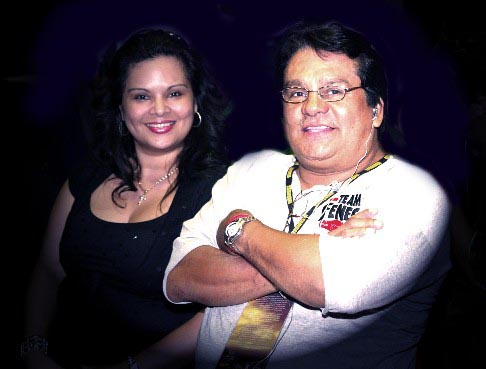 There is a question regarding your not defending your title outside of Panama until
your seventh or eighth defense. Was it out of fear of possibly losing your title after the
DeJesus nontitle-bout loss?
There is a question regarding your not defending your title outside of Panama until
your seventh or eighth defense. Was it out of fear of possibly losing your title after the
DeJesus nontitle-bout loss?
[Directly to me]: I'm sorry you don't
understand my English, but you don't understand me. You don't understand what I speak, but
listen to me: DeJesus is with me in New York. He knocked down me...in New York. When we go
to Panama, I gave him the opportunity for my belt. Me knock him out, Esteban DeJesus. I go
to de Los Angeles, then go to Las Vegas, Esteban DeJesus is the [WBC Lightweight] champion
of the world, Roberto Duran, [WBA Lightweight] champion of the world for the championship
of the world in Caesar's Palace in Las Vegas. [Through his interpreter] And that
was the first championship in Las Vegas. [Directly to me]: I knock him out for the
champion[ship] of Panama! Listen to me: for the champion[ship], me knock him out. Cuando,
DeJesus, me knock him out for the champion[ship], Unitos de Titolo [i.e., to unify the
lightweight titles], and me knock him out -- Esteban DeJesus -- at Caesar's Palace.
You fought with a ferociousness and intensity that once prompted heavyweight contender
Jerry Quarry, when serving as a TV commentator, to say that he wouldn't want to be in the
ring with you. What fueled your savagery and intensity?
I always worked as a hard
fighter. Even after I won my championship, nobody wanted to fight me for many, many
months. For more than a year, nobody wanted to fight me! It's not because I didn't want to
fight anybody, it's just that people simply feared me. I was a hard fighter, I came
prepared, and I was hungry, and what I attribute my career to -- that I was always
prepared and hungry to win the title. But, people feared me. And it's not because I was an
angry man or anything like that. No, that wasn't a fact. The fact was that I came prepared
and I did my work.
Nobody wanted to fight me in my weight class! Everybody made me move up or move down, in
different weight classes to fight me. It wasn't because they wanted to fight me at my
weight class; it was because they wanted to fight me at their weight class.
Speaking of which, it was once reported that you said that you could beat Muhammad Ali
in a street fight. Were you serious?
That was just a joke. A street fight has
nothing to do with the ring, really.
Your defensive abilities and knack for rarely getting hit flush were often overlooked.
How did you learn to do this, to roll and ride with the punches so?
That was just
simply my style. I've always been taught from early on to have great defense, and that was
the way I was trained by my trainers. But, it wasn't for any particular reason in why I
was more aggressive than the other fighters. That happened to be a skill that I had over
the others. If you show any fear on top of the ring, you know, fighters smell that as
weakness, and they realize that, and they work that much harder, as opposed to fighting
that much harder. It's just a sign of weakness.
What were your top memories in boxing, and why?
My whole career. My whole
career is just a phenomenal being that as far as memories are concerned, there is no one
thing that jumps out more than the other. Just my whole career was a lasting career, one
that I'm very fond of, one I'm very proud of.
What were some of the more scandalous or shocking experiences you've had in the fight
game and why? And were you ever asked to take a dive?
The toughest fight I ever
had was not the fighter; it was losing weight, itself. I never took a dive for anybody. I
never allowed myself -- or my principle -- to get that in way, or to allow myself to use a
fight that way. My biggest adversary was weight, itself, not the fighter.
What do you think of today's lightweight division and its champions?
[Directly to me]: I'm sorry for you, but you [ask] too much questions. I'm sorry.
Finish! Finish!
With your fights against Sugar Ray Leonard --
-- It's unfortunate, the second
fight. The first fight was always in the clear who won and there were no circumstances to
that, but the second fight, a lot of people don't want to believe that I was sick and lost
a lot of weight for that fight. You know, it's unfortunate. Obviously, that third fight
came many years later, but he never wanted to give me that rematch. And, even then in the
third fight, I had to come down to his weight class, as opposed to my weight class.
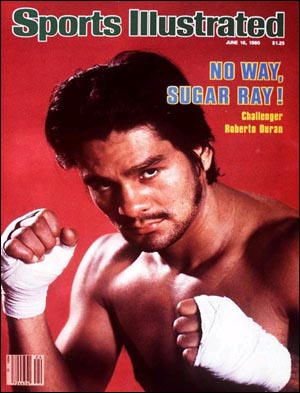 What did you think about Leonard as a fighter and as a person?
What did you think about Leonard as a fighter and as a person?
He's one of the
greatest U.S. fighters of all time. Obviously, his track record speaks for itself. He's
one of the greatest U.S. fighters of all time, but he always knew what Roberto Duran meant
to his career.
[Editor's note: Duran excused himself from the interview at this point and revisited
questions several hours later, as he'd had a long day.]
Against Marvin Hagler, you managed to frustrate him, get into his head and go the
distance with this middleweight champ. Watching this bout, I thought that you been able to
punch harder, I thought you might have been able to beat him and maybe even knock him out.
Please, tell us what happened.
I truly feel and believe in my heart that I won
that fight. I think that due to fact that it was here in the United States and he was a
favorite in the fight, such that maybe the judges might have swung his way. I do feel
maybe I gave up the last three rounds to it, but I started the fight early, I think I got
up on him early, in another round as well, I felt myself splitting during the last several
rounds there toward the end. And I felt that was due to a lack of conditioning towards the
end, there. But, I really did, I won that fight and it's an arguable fight, because it
could have gone either way.
Against Iran Barkley, you were taking terrific body shots early in the bout. They must
have hurt! What did you think in the fourth round with eight to go?
Iran Barkley's
an interesting fight because I knew he was powerful and I felt that if he kept on punching
me underneath, I was hoping to [catch him over the top and] knock him out early. I knew
that as the rounds kept on getting higher, the harder it was going to be for me. But, I
came more conditioned, I knew what I was prepared of, I knew that I would be a champion
again, and it was just a matter of time before I worked my way to it.
Versus Wilfredo Benitez, were you stale or was he just the wrong match for you?
Unfortunately, when Benitez beat me, I was going through some troubles some time in my
personal life. The president of Panama, who was one of my closest friends at the time, he
had just passed away, and they sent me to a training camp where I was isolated and I
didn't have means to communicate with my wife and just mentally, I wasn't prepared. There
were so many things that were going on in my personal life, that were just really, really
tough for me personally and my mind wasn't there 100 percent, as it should be, during
training that I was wondering around, my mind wasn't -- unfortunately, I didn't give it
the full attention that the fight deserved. So I really feel that the fact that I was
frustrated in it, that Benitez was able to get the best of me that day.
How about Kirkland Lang?
You know, those were fights that, the point is that
like Kirkland Lang, who really was a good fighter, but really wasn't made of much, was a
fight that I really had to lose a lot of weight for and, unfortunately, didn't want to
take the fight that I wanted them to take under contract. They made me lose more weight
and go to their specific weight or particular weight that they wanted to fight at, and
then they would increase my purse. So, obviously, I was sucked into their game. But, it
was a lack of conditioning on my part and trying to lose all that weight and fighting at a
weight class that they wanted me to fight.
Against Pipino Cuevas, did you go in fearing his left hook and biding your time? It
kind of appeared that way, according to a reader.
I wasn't really too worried
about his left, even though it was his strong point. I was actually preparing for another
fight and Bob Arum approached me and the winner of the fight would fight Davey Moore for
the championship. So, obviously, I changed my game plan and I changed everything I was
doing for the chance to fight Davey Moore for the title. That was my concern, trying to
win another title. So, I really wasn't worried about what Cuevas had, or how he was
particularly as a fighter with his left or his right. I knew he was a good fighter, and I
just came prepared to fight that fight and I prepared myself. And, even then, I was
preparing myself for a different style of fighting, so my training took a back seat, as
far as my regimen was, and I had to change it. But, nonetheless, I really wanted to fight.
The disadvantage was that we were fighting at a weight class that Cuevas wanted, but the
advantage that I had was that I was already training and, even though for a different
style, I had good stamina.
Jumping ahead to this last year, what was your reaction to Jose Luis Castillo not
making weight for his third bout versus Diego Corrales?
You know, the first fight
-- Castillo's a veteran -- even after the first fight, he knew that he was going to have a
hard time making the lightweight division weight. The second time, he had a hard time
making weight. We feel that it's the fighter's responsibility to make weight. Whatever
happened -- whether it was during sparring, what a lot of people said happened, or simply
due to the fact that he couldn't make weight -- it's the fighter's responsibility. I do
feel that he came in a couple pounds overweight for the second fight and he still
dominated. And Corrales also ballooned up. For the third time, the guy should have known
what he was doing. And the third fight, the difference is that maybe he assumed Corrales,
since he was having a hard time making weight again, maybe Corrales would give him the
fight and he maybe thought if he came in a couple pounds overweight and it wouldn't make a
difference. But, Corrales had every right to be mad and I give him the fight, the third
match.
Several years ago when you were still fighting, there were alarmist reports that said
that your medicals indicated that your brain mass was shrinking. Can you tell us if there
was any truth to this?
Absolutely not. Absolutely not!
Tell us about your bouts against Hector Camacho. Why did you take them and what did you
think of him as a fighter and a person?
The first fight, I definitely feel that I
won that match without a doubt. I wanted to fight at 168 and he wanted to fight at 162 and
I had to lose a lot of weight for that match. Unfortunately, at the time, my manager hired
newly, Tony Gonzalez, paid the training facility and venue in Denver, Colorado to fight
and, unfortunately, the training and high altitude and at my age at that time, it makes a
big difference, especially when you're trying to lose the weight you're trying to lose.
But, he wasn't able to knock me out, I gave him a hard fight -- [To me directly]:
Hello? It is okay. I no give you no more of my story, you know. Thank you very much. Pero,
no more, no more my story. See, my story is especial. You understand me?
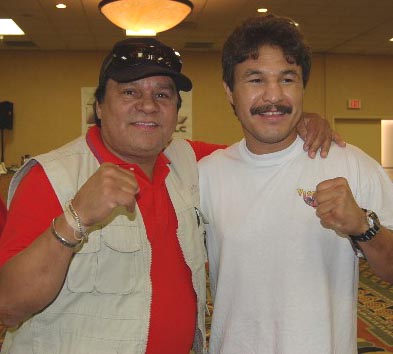 Yes, yes, I understand. I appreciate your time. And, let me tell you: I've always been
a big fan of yours. I think you're one of the best, if not the best lightweight champions
in the history of boxing, and it's very special for me to talk with you on the
phone.
Yes, yes, I understand. I appreciate your time. And, let me tell you: I've always been
a big fan of yours. I think you're one of the best, if not the best lightweight champions
in the history of boxing, and it's very special for me to talk with you on the
phone.
Thank you very much. It's an honor that you feel that way. I don't want you
to be offended, but I definitely have a lot to say, and I want to say it through the
theater. I would like to make a movie of my life because it's going to be an interesting
movie. I appreciate your kind words and your accolades for me. I just really hope that the
fans will be able to see something in the future in the movies. A lot of the questions you're asking about comparisons to my career, and about my
brothers' names and my father's name, I do that because you're a friend of my daughter's,
and I appreciate that, but those are questions that I normally don't answer. But I want
you to know that I did it for my daughter, and I appreciate what you're doing for us as
well.
And, like that, the great ring predator that was Roberto Duran magnanimously excused himself.
Even years later, something tells me that fighters everywhere sleep just a little easier now
that he no longer trolls their ranks looking for someone to devour.
Juan C. Ayllon is the news editor and a staff writer for the Cyber Boxing Zone. He can
be reached at juancayllon@yahoo.com.
contents
|

